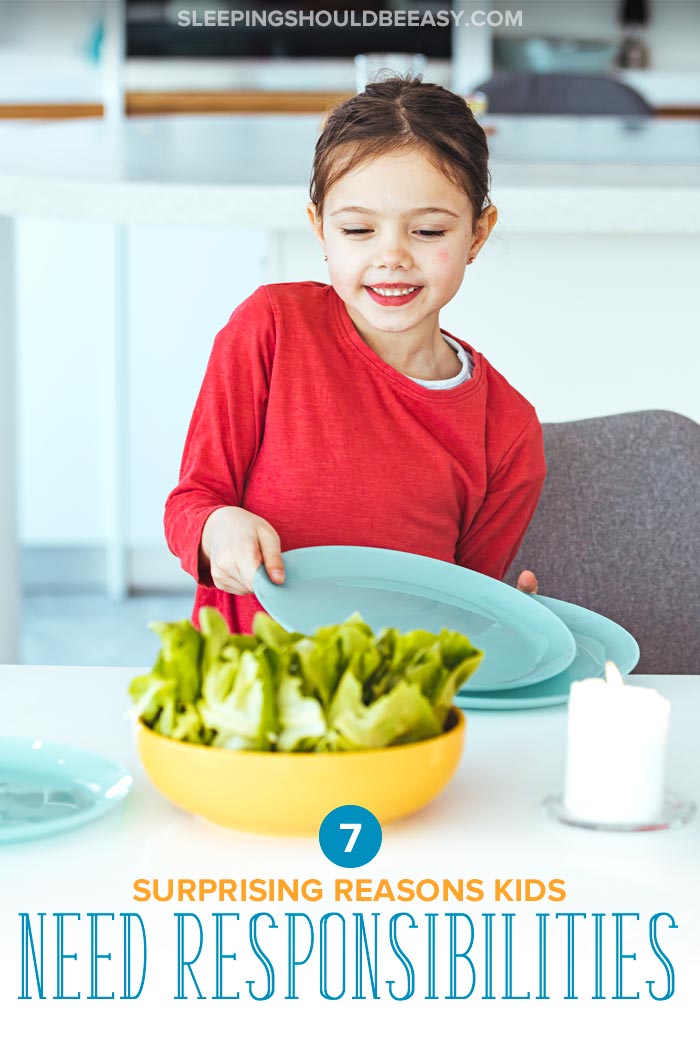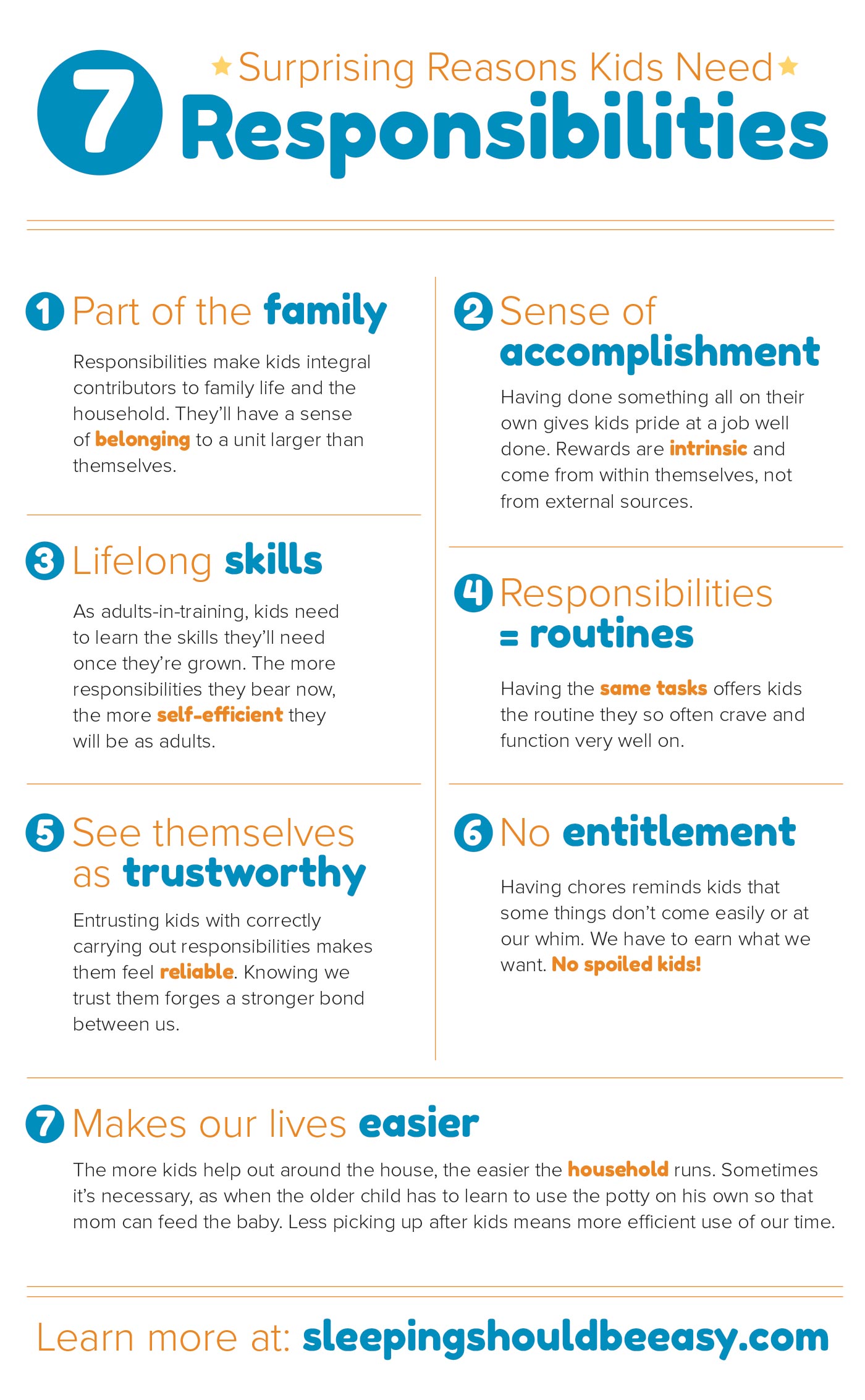7 Surprising Reasons Kids Need Responsibilities
Do you do everything for your kids? It may be time to stop. Here are 7 surprising reasons kids need responsibilities (with examples by age).
 If it weren’t for my husband, my kids would still need me to remove their pajamas and put on their shoes. Thankfully, my other half expected much more from the start. He gave age-appropriate responsibilities not only to establish independence but out of necessity. (Three kids can do that to you.)
If it weren’t for my husband, my kids would still need me to remove their pajamas and put on their shoes. Thankfully, my other half expected much more from the start. He gave age-appropriate responsibilities not only to establish independence but out of necessity. (Three kids can do that to you.)
It turns out, kids can do most of what we ask them to do, even at a young age. Sure, watching your child apply toothpaste and brush her teeth is ten times slower than if you had stepped in. But giving her more responsibilities is instrumental in her growth.
Responsibilities can even stem from as early as infancy. Allowing your baby to hold her bottle can be messy and take longer. But this bit of “awkward practice” is a temporary hassle for her independence (not to mention your free hands).
Table of Contents
7 surprising reasons kids need responsibilities
From age-appropriate chores to homework, giving kids responsibilities makes life smoother and nurtures competence. I learned several surprising reasons why handing kids more responsibilities benefits everyone.
No matter how compelled you feel to coddle and save, taking a step back can be the biggest gift you give your child. Take a look at these reasons kids need responsibilities:
1. No entitlement
Worried that your child is starting to feel entitled? Maybe she demands snacks at random times of the day or expects a toy at each grocery outing.
One of the benefits of chores is reminding kids that many things can take effort and time. We usually reap the results of our work, from the money we earn to the finished puzzle piece. Wanting something doesn’t always mean we get it right at that moment.
Responsibilities show that plenty of good things happen over time. Harvesting a garden is the result of patience and persistence, and a prized toy from months of saving. Chipping away at a task and taking consistent action are key.
Free resource: Want to stop your child from feeling entitled? Join my newsletter and grab your copy of How to Unspoil Your Child! Learn tips that not only curb misbehavior but focus on rebuilding a strong parent-child relationship. Get it below—at no cost to you:
2. Kids feel part of the family
Responsibilities make kids integral contributors to family life and the household. They’re not just passively receiving and waiting for things to happen to them. Instead, they have a sense of belonging to a family unit larger than themselves.
A perfect opportunity to teach this lesson is through household chores. Tasks as simple as setting the table or dusting the furniture make everyone part of a greater “cause.” That might be preparing for visitors or simply doing one’s part for the family.
3. A sense of accomplishment
Kids delight in the feeling of having done something on their own. That might be figuring out a math problem or washing the dishes in the sink. Each completed task is one more thing contributing to their feeling of accomplishment.
Having done something on their own gives them pride in a job well done. Rewards are intrinsic and come from within themselves, not from external sources. We shouldn’t reward kids with candy or money—it might work the first few times, but it doesn’t do much to build their sense of pride.
4. Lifelong skills
As adults-in-training, kids need to learn the skills they’ll likely need once they’re grown. At some point, they shouldn’t have to rely on us all the time. Childhood becomes the perfect place to “practice” and make minor mistakes.
That way, come adulthood—when the stakes are much higher—they’ve already experienced and learned these skills. The more responsibilities they bear now, the more self-efficient they can be as adults.
Discover the 8 life skills all kids need to learn by adulthood.

5. Responsibilities provide routines
Kids thrive on predictability. They’re less likely to whine and complain when these responsibilities happen all the time. You won’t need to remind your child to wash his hands before eating or make the bed in the morning because these tasks have become part of the routine.
Routines also feel reassuring. The familiarity of chores provides the structure and “sameness” that calms anxieties and worries. This is especially helpful if he’s going through changes in his life, from welcoming a new baby to adjusting to a new school.
6. Kids see themselves as trustworthy
Kids will meet our expectations, whether we set them high or low. Entrusting them with carrying out responsibilities a notch above their level makes them feel reliable. But doubt their abilities, and they can believe the same about themselves.
They’re also less likely to sever the trust we have in them when we’re more willing to give it to them. Your child wants to do a good job of helping you bake when you allow and trust him to do so.
Learn how to get kids to do chores.

7. Responsibilities make our lives easier
The more your child helps out around the house, the easier the household runs. Sure, she may not do a good job in the beginning as she learns to dry dishes or sweep the floor. But the more she practices, the better she gets. Eventually, she’ll do a fantastic job and her contribution helps make your life easier.
And sometimes, rising to responsibility is necessary. Your child may have to learn how to use the potty on her own so that you can feed the baby. This becomes a perfect opportunity to assume responsibilities around the house.
The less you need to tend to her needs and pick up after her, the more time you can devote to other things.

Responsibilities by age
Now that you know its importance, what are some responsibilities kids can do? Below are several examples of household tasks broken down by age range.
Babies
- Hold bottles. At around five or six months, your baby can start practicing holding her bottle.
- Feed herself. Give her a chance to move the spoon toward her mouth, and eventually scoop her food.
- Get around. As much as possible, give her the chance to move around and be more independent. You might let her crawl on the ground instead of carrying her in your arms or allow her to walk next to her instead of sitting in a stroller.
Toddlers
- Put toys away. What better way to transition to bedtime than to encourage putting toys away? At this age, putting toys back into her tubs and boxes can be a game in itself, so take advantage!
- Dust with a rag. Have your child clean messes and surfaces and even make it a “game.” You can spray the table and she can wipe it with a rag.
- Place clothes in the hamper. Have your child put her clothes into the hamper so she knows where dirty clothes go. She can also load wet clothes into the dryer.
Preschoolers
Disclosure: This article contains affiliate links. As an Amazon Associate, I earn from qualifying purchases.
- Change the bed sheets. Your preschooler can enjoy removing the sheets when it’s time to take them off. Ask her to place the dirty ones in a hamper as well.
- Sweep. Using a child-sized broom and duster, she can learn to sweep the floor. Here’s a trick: using painter’s tape, mark a square on the floor and have her sweep all the dust into that square.
- Water plants. Using a child-sized watering can, guide her to water the plants around the house. Don’t fill the water all the way, and help her with the first few tries.
- Throw trash away. Show her how to tie her trash bag and toss it into the bins.
Big kids
- Wash dishes. Have your child step on a stool to wash dishes. Show her how to squeeze soap on a sponge and wash the dishes. Then, she can place them on a drying rack. Similarly, have her put dishes in the dishwasher.
- Hang clothes. She can hang her shirts and pants on hangers after a load of laundry. She might be too tall to hook the hanger back in the closet if it’s too high, but she can help make sure all the clothes are hung.
- Set the table. Now that she knows which dishes everyone uses, her responsibility can be to set the table. Start with non-breakables first, then work up to regular plates and utensils.
- Help put groceries away. After shopping for your food, encourage her to put them away, at least those she can reach.
- Wash her own laundry. No more doing her laundry! She can load the machines and put clothes away on a weekly basis.
Conclusion
Giving kids responsibilities is a win-win solution for everyone. You prevent your child from feeling entitled, and instead nurture a sense of belonging to the family. She can feel a sense of accomplishment while developing lifelong skills she’ll likely need into adulthood.
Responsibilities also provide a sense of routine so that you don’t have to nag her to do things. She can feel more trustworthy, and finally help around the house. No more removing pajamas or putting shoes on forever, mama!
Get more tips:
- The Difference between Rules and Responsibilities
- How to Get Your Kids to Clean Up After Themselves
- 6 Not-So-Obvious Reasons You Can’t Keep Up with Cleaning Your Home
- What to Do When Your Child Says No to Everything
Don’t forget: Join my newsletter and grab your copy of How to Unspoil Your Child below:

